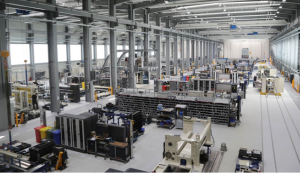Descartes 2024 Global Transportation Management Benchmark Survey Highlights
How are shippers and logistics services providers (LSPs) preparing for transportation industry and regulatory changes? The top reply by forty percent (40%) of the respondents is to invest in technology. The number rises to 44% when looking only at companies that consider transportation a ‘Competitive Weapon’, which is one of the most significant findings of Descartes 8th Annual Global Transportation Management Benchmark Survey. The report examines and analyzes trends and investment strategies from over 630 global transportation professionals.
Each year, Descartes’ benchmark survey investigates how companies perceive the role of transportation management and identifies key industry trends driving the market. It also examines how transportation value is measured, and helps uncover the capabilities, technologies, and competitive strategies making the most significant impact. Finally, the survey also provides an outlook for future IT investment, offering a comprehensive overview of the transportation management landscape.
This year, the survey results show a dynamic landscape where regulatory changes, cost pressures, and sustainability efforts are significantly affecting the transportation industry. Mike Hane, Director Product Marketing at Descartes states, “We continue to see that companies that view transportation as a ‘Competitive Weapon’ versus those that view it as ‘Not Important’ focus more on growing their business, provide more delivery options for their customers, share transportation information more freely, and are more likely to be an early adopter when it comes to new strategies.”
The key trends and practices highlighted by the report are:
Fuel costs remain as the biggest factor having the greatest market impact over the next 5 years. Consistently a significant concern, fuel costs maintained their position among the top three impact categories, rising to 52% from 37% in 2023. This increase underscores the persistent concern for fuel prices and their critical impact on transportation expenses. Companies are likely to continue prioritizing fuel efficiency and cost management strategies to mitigate high fuel prices, and potential fluctuations.
Visibility is the top capability for effective transportation management. The survey results highlight the ongoing significance of visibility in effective transportation management at 42%. However, this year's data shows a geographical disparity, with 51% of North American respondents prioritizing visibility compared to only 33% of European respondents. This points to regional differences in transportation management priorities, influenced by distinct market conditions, regulatory frameworks, and technology adoption rates.
Business growth is driving the expansion of transportation management for Top Performers. Transportation management expansion is primarily driven by business growth for companies that consider transportation a Competitive Weapon and companies with industry leading financial performance (Top Performer). Across the entire set of respondents, cost reduction was the top driving factor with 40% response rate, albeit led by companies that consider transportation a basic service and those with poorer financial performance. The prioritization of cost reduction underscores the ongoing pressure to optimize logistics and supply chain operations while an equal focus on customer service and growth by leading companies reflects a balanced approach, emphasizing not only cost efficiency but also service quality and market expansion.
Sustainability is a crucial component of daily transportation decisions. Sustainability continues its growth as a crucial factor in transportation organizations, indicated by 90% of respondents that at a minimum report on their carbon footprint or account for sustainability in their planning and decisions. 42% of respondents factor sustainability into strategic transportation plans, highlighting a considerable industry shift towards environmentally responsible practices. This indicates companies increasingly recognizing the critical importance of sustainability in their long-term strategies, driven by regulatory pressures, customer expectations, and the broader societal push towards reducing carbon footprints.
Three-fourths of companies plan to increase their transportation management investments over the next two years. While the 2024 outlook for transportation management IT spend reveals a decline in the percentage of companies planning to increase their IT budgets by over 5%, dropping to 22% from 33% in 2023, three-fourths of respondents still indicate plans to increase their transportation management IT investments over the next two years. While the top financial performers were two and a half times more likely than poorer financial performers to increase transportation management IT investment by 5%+. This suggests a continued recognition of IT's critical role in transportation management, but with more measured and strategic investment growth. The data implies that, despite a tempered approach to substantial budget increases, the commitment to enhancing transportation management through IT remains robust among most companies, especially those looking for business growth and more increased flexibility for their customers.
About Descartes
Descartes provides on-demand, software-as-a-service solutions aimed at enhancing the productivity, security, and sustainability of logistics-intensive businesses. Customers leverage Descartes' modular solutions to route, track, and improve the safety, performance, and compliance of delivery resources; plan, allocate, and execute shipments; rate, audit, and pay transportation invoices; access global trade data; file customs and security documents for imports and exports; and complete various other logistics processes by engaging in the world's largest collaborative multimodal logistics community.






